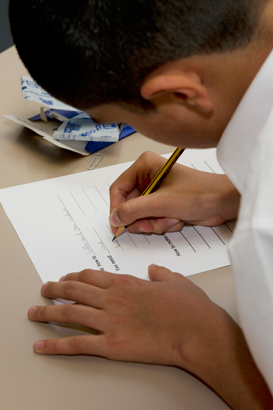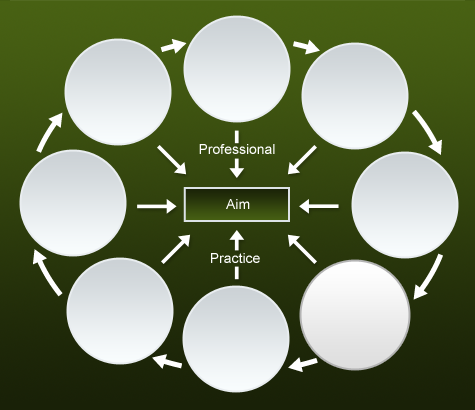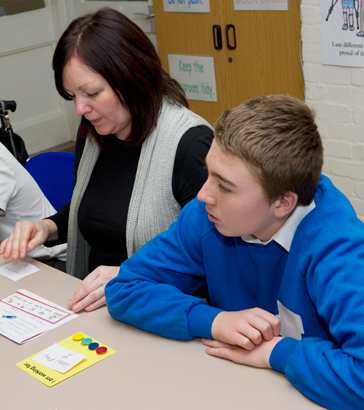
Many of us may have been involved with some form of research at one stage of the process, possibly as participants/respondents (eg as individuals giving information through a questionnaire) within market research. However, when engaging in the inquiry process as a researcher we become aware that research involves a number of stages.
It is important to adopt a research framework during your inquiry. This ensures that each of the research stages is considered as you plan your research. You will go through this process twice – once in thinking through your research plans, and the other practically as you do the research.
Click on each stage of research to reveal more information.
- Deciding on the topic.
- Finding out as much as possible about what is already known about the topic.
- Identifying and defining the 'variables' (factors which are likely to change).
- Creating a research question.
- Identifying appropriate methods to study the topic and seek answers.
- Obtaining resources needed to carry out the research.
- Creating a time line.
- That the methods chosen will achieve the project's aim.
- That the information gathered will be useable.
- That the proposal meets ethical guidelines.
- By carrying out a 'pilot study' (small scale rehearsal).
- Collecting the data (conducting interviews, questionnaires, observations etc).
- Recording the data.
- Summarising the results.
- Drawing conclusions.
- Making recommendations or devising applications.
- Presenting the report.

Planning
Testing
Doing
The illustrated model is a framework which describes the different research stages using everyday language rather than traditional research terms.
There are eight stages to the accessible research cycle (ARC) (Jones et al, 2012) each of which describes a phase of research. These are described in more detail on the following pages.

What do I
want to know?
How will I
apply it to my
practice?
What has
been said
previously?
What are the
possible ways to
investigate what
I want to
know?
How can I
involve people
in my research
and enable their
informed
choice?
How am I
going to gather
the information?
How am I
going to make
sense of the
information
gathered?
How am I
going to share
my discoveries?
How do my
discoveries
relate to my
practice?

Stage 1: What do I want to know?
This stage is about drafting your research question, deciding exactly what you want to find out at the end of the project.
(It may change after your reading in Stage 2.)
Stage 2: What has been said previously
It is important to read what others have said about the topic you have chosen so you can:
- Learn more about your topic;
- Learn how other researchers explored the topic;
- Learn what went right and wrong for them;
- Think some more about your research question;
- Use what others have said to guide your research.
Stage 3: Possible ways to investigate
The way you collect information will depend on your decisions about the focus of your research question, the information you
need to answer it, your chosen topic, your setting, and your skills.
Stage 4: How am I going to involve others?
Here, you need to identify:
- The people who are the focus of the inquiry;
- Any who are going to help you with the inquiry;
- Research ethics – the rights of the people you are involving, and your responsibilities as a researcher.
Stage 5: How am I going to gather the information?
There are different ways of collecting data depending on the information you need to answer your question. You need to check:
- You are collecting the right information to answer your question;
- Accuracy;
- The practicalities of collecting information.
Stage 6: How am I going to make sense of the information I have collected?
The way you work with the information will depend on what information you have collected, and what you want to find out. This
will lead you into a discussion about how well the research has answered your research question.
Stage 7: Sharing my discoveries
An important part of inquiry is sharing what you have found out with others. This means that as many people as possible can
benefit from the research and others can see how you have done it and check its validity.
Stage 8: How discoveries relate to practice
All inquiry needs to be useful – not just inquiry for inquiry's sake. Whether the inquiry achieves expected or unexpected
outcomes, it should affect practice (eg the adoption or abandonment of different approaches). It may lead to further research
questions to explore.

Although these inquiry stages are presented as though they are separate and occur in a set sequence, it is important to realise that they all inform one another. A change in one area may affect others. For example, reading what has been said about the topic you have chosen (Stage 2) may lead you to change your research question (Stage 1). Decisions made about your research question may also affect how you plan to collect and analyse information (Stages 3 and 4).

Jones, P., Whitehurst, T. and Egerton, J. (2012) Creating Meaningful Inquiry in Inclusive Classrooms: Practitioners' stories of research. London: Routledge.